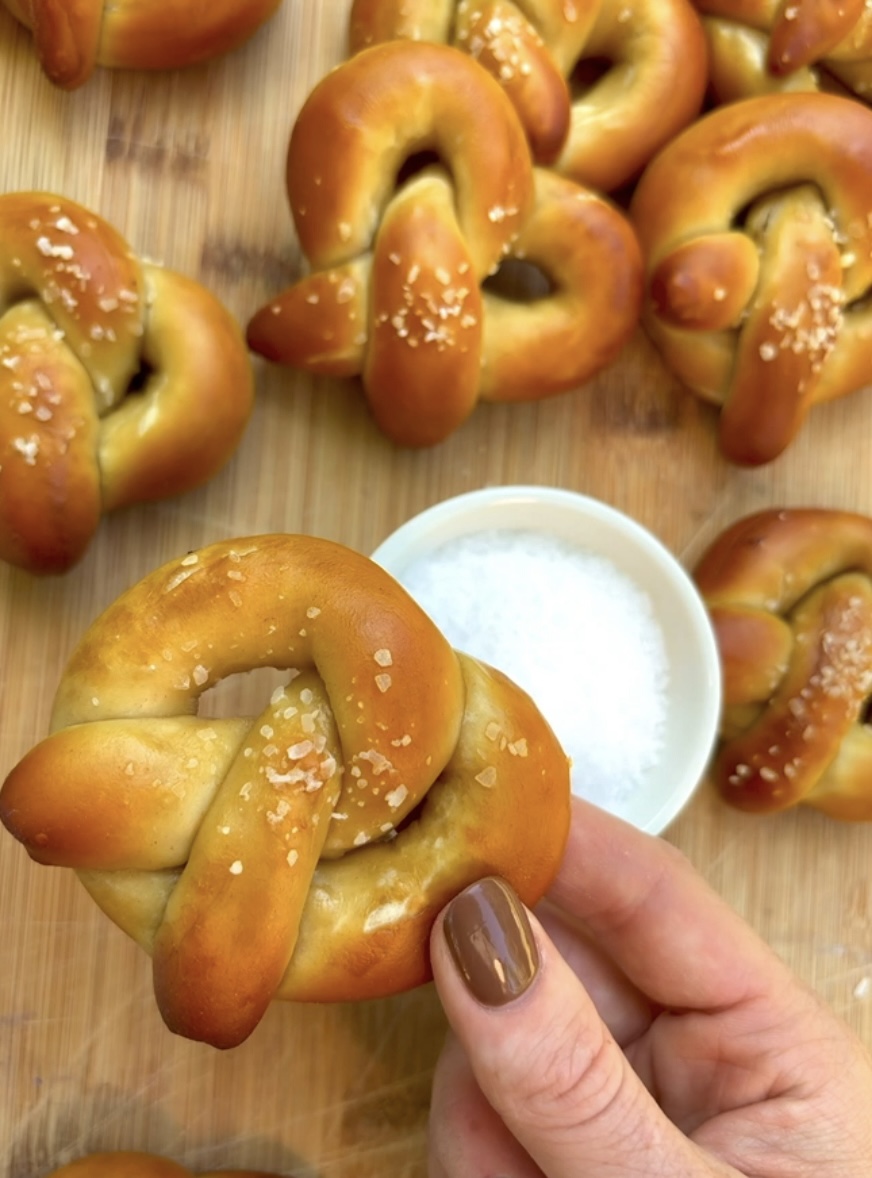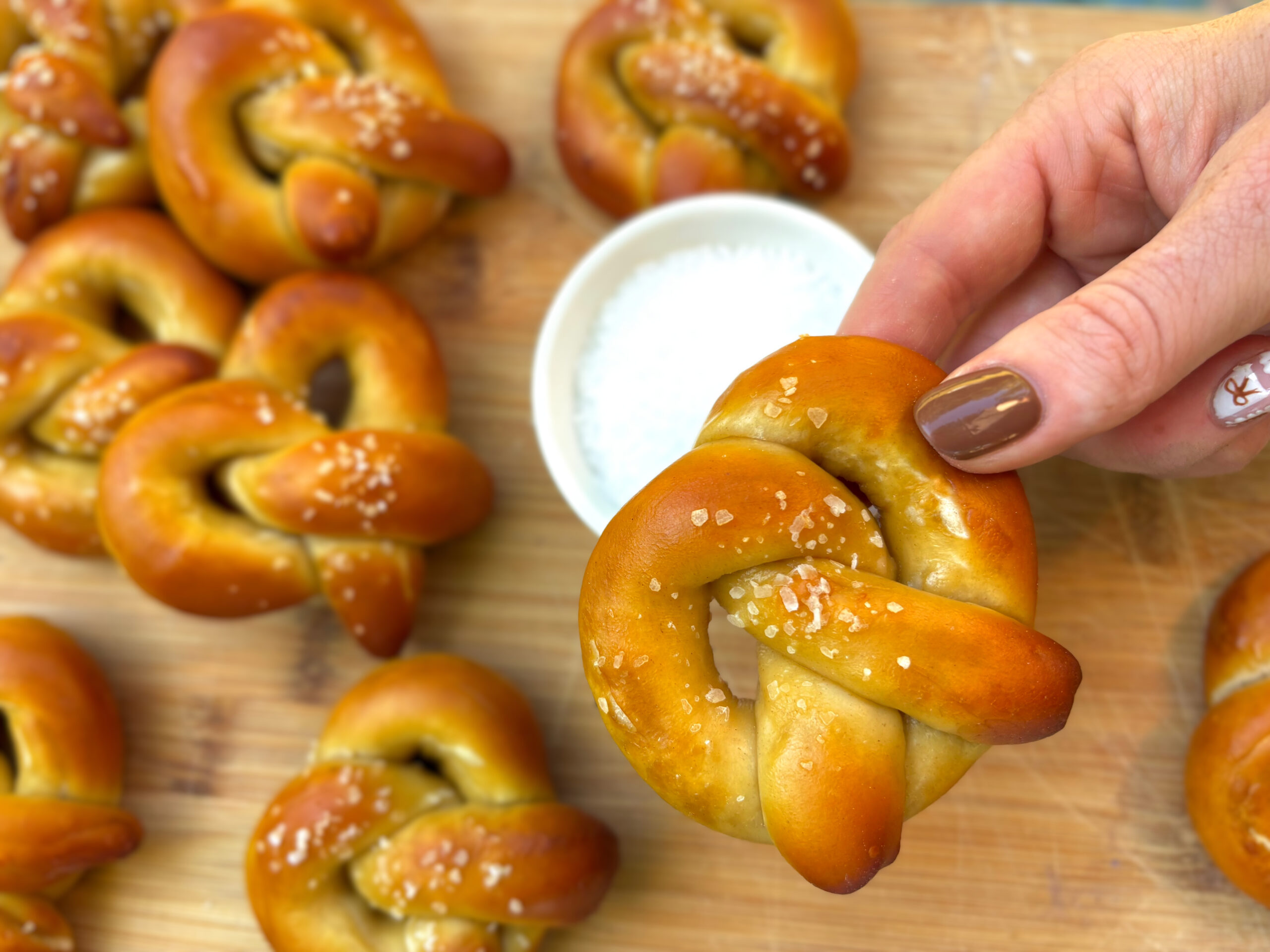
Soft Sourdough Pretzels
These homemade sourdough pretzels strike the perfect balance between soft and chewy, with a deep golden crust and that classic pretzel flavor – thanks to a slow, cold fermentation and an optional lye bath for bakery-style results. Made with active sourdough starter, a touch of honey, and simple pantry staples, this recipe transforms basic ingredients into something truly special. Whether you go the traditional route with pretzel salt or try a cinnamon sugar variation, these are endlessly snackable, freezer-friendly, and well worth the wait.This recipe is perfect for sourdough bakers looking to go beyond bread and try something a little different — and a lot more fun. I’ll walk you through each step, including shaping, dipping, baking, and storing — plus tips for using a baking soda bath if lye isn’t your thing. Let’s get pretzeling!
Ingredients
Method
Instructions
- Make the Dough
- In the bowl of a stand mixer, combine:
- Sourdough starter
- Warm water
- Honey (or brown sugar)
- Melted butter
- Salt
- About half the flour
- Mix until you get a cohesive, sticky batter.
- Tip: A stand mixer is strongly recommended for this recipe. The dough is soft and sticky — using a mixer allows for better gluten development without needing to over-flour, which can toughen the pretzels.
- Knead Until Smooth
- Attach the dough hook and start kneading on low speed. Slowly add more flour, a bit at a time, until the dough starts pulling away from the sides of the bowl. It should still be soft and slightly tacky, but not stick to your fingers.
- Continue kneading for another 5–10 minutes, or until the dough is smooth and elastic.
- First Rise (Bulk Ferment)
- Transfer the dough to a lightly greased bowl. Cover with plastic wrap or a damp towel and let it rise in a warm, draft-free place until nearly doubled — about 5 to 7 hours.
- Cold Fermentation
- Once it has risen, move the covered bowl to the fridge and let it rest overnight (12–18 hours). This improves flavor and texture.
- The Next Day
- Prep for Baking
- Preheat your oven to 400°F (205°C). Line 2–3 baking sheets with parchment paper and set aside.
- If using a lye bath, prepare it now in a well-ventilated space, wearing gloves and eye protection (see below for safety tips and alternatives).
- Lye Bath (Traditional Method)
- If you’re comfortable working with lye, it creates that deep golden crust and authentic flavor.
- Place a wide, deep glass or ceramic baking dish (about 2.75 qt) on one of your parchment-lined baking trays. Pour in 8 cups (1.9 L) of water, then slowly and carefully add ¼ cup (55 g) food-grade lye. Stir gently with a stainless steel spoon until dissolved. Set aside.
- Safety First: Always wear gloves and eye protection when working with lye. Avoid contact with skin and surfaces. Work near an open window or fan if possible. See notes below for proper disposal.
- Baking Soda Bath (Alternative Option)
- Prefer not to use lye? You can still get delicious results using baking soda.
- Bring 8 cups of water and ¼ cup (66 g) baking soda to a boil in a large pot. Gently lower each pretzel into the boiling bath for 30 seconds per side. Remove and drain well.
- For a darker crust, you can brush each pretzel with a beaten egg mixed with 1 tablespoon water before baking.
- Shape the Pretzels
- Take the chilled dough out of the fridge and divide it into 10 equal pieces. Work quickly, while the dough is still cold — if it warms up too much, it may become too soft to handle.
- Roll each piece into a rope about 20–24 inches (50–60 cm) long. Twist into classic pretzel shapes. Use a bit of flour on your work surface if needed, but keep it minimal.
- Dip & Top
- Using a slotted spatula or spider, carefully lower each pretzel into the lye (or baking soda) bath for about 30 seconds. Remove, drain off excess liquid, and place on your prepared baking sheets. Leave at least 2 inches of space between pretzels.
- Sprinkle generously with pretzel salt.
- Bake
- Place trays on the center rack and bake one tray at a time for 12 minutes, rotating halfway through. Pretzels are done when they’re a deep, even golden brown.
- Let cool slightly before serving. If any stick to the parchment, gently peel them off once cooled.
Notes
Optional Variations & Notes
⚠️ Working with Lye:
Use only food-grade lye. Always wear gloves and goggles when handling. Work in a ventilated space and avoid splashing.
To dispose of lye water: Carefully dump & flush it down the toilet. Or, neutralize it with 2½ cups of vinegar, then pour down the drain with cold water running. 🥨 Cinnamon-Sugar Pretzels:
Skip the salt. Once baked, brush warm pretzels with melted salted butter (about ¼ cup/57g), then dip or sprinkle with cinnamon sugar.
The Best Equipment Essentials: Baking Sheet-https://amzn.to/430ciP6 Silicone Baking Mat- https://amzn.to/4gZCway Stainless Steel Pot- https://amzn.to/3WiwgB0 Slotted Spoon- https://amzn.to/3IwaTJn Cooling Rack- https://amzn.to/48eO47l Mixing Bowls- https://amzn.to/4pKm4Pc Digital Kitchen Scale- https://amzn.to/4pYHoRm Bench Scraper- https://amzn.to/48Szi6m Pastry Brush- https://amzn.to/489CudJ
Use only food-grade lye. Always wear gloves and goggles when handling. Work in a ventilated space and avoid splashing.
To dispose of lye water: Carefully dump & flush it down the toilet. Or, neutralize it with 2½ cups of vinegar, then pour down the drain with cold water running. 🥨 Cinnamon-Sugar Pretzels:
Skip the salt. Once baked, brush warm pretzels with melted salted butter (about ¼ cup/57g), then dip or sprinkle with cinnamon sugar.
The Best Equipment Essentials: Baking Sheet-https://amzn.to/430ciP6 Silicone Baking Mat- https://amzn.to/4gZCway Stainless Steel Pot- https://amzn.to/3WiwgB0 Slotted Spoon- https://amzn.to/3IwaTJn Cooling Rack- https://amzn.to/48eO47l Mixing Bowls- https://amzn.to/4pKm4Pc Digital Kitchen Scale- https://amzn.to/4pYHoRm Bench Scraper- https://amzn.to/48Szi6m Pastry Brush- https://amzn.to/489CudJ


Leave a Reply